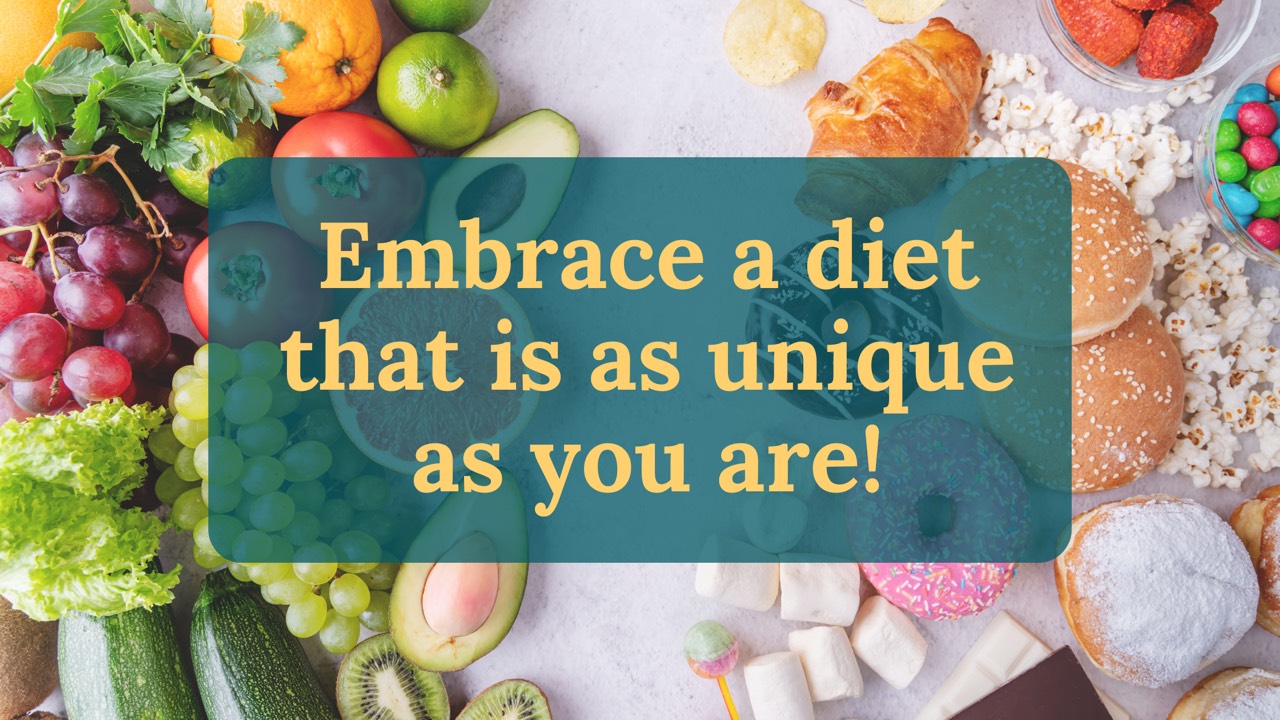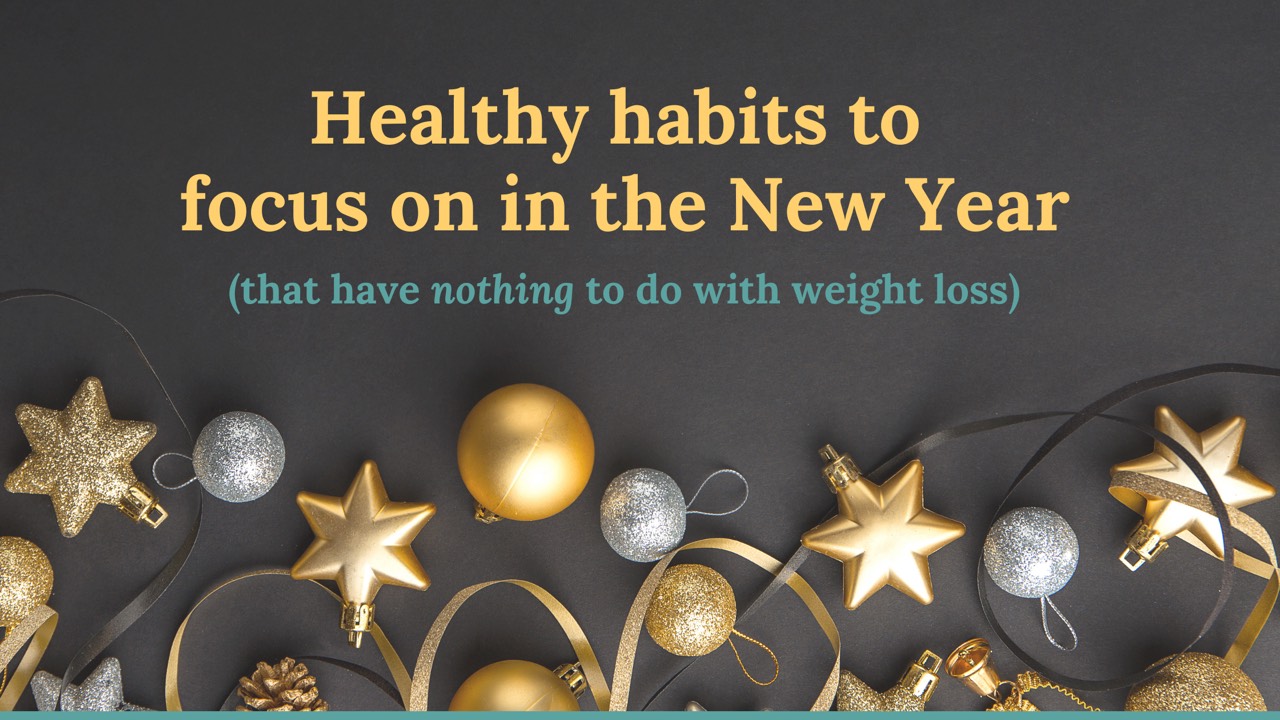BLOG
Find support not just for emotional eating, but all aspects of your well-being.
What is “Last Supper” Eating? (and how to stop doing it)

Does this sound familiar: you feel dissatisfied with your body and decide to start a new diet (probably on a Monday). It’s going to be a clean slate! You’ll be perfect! You’ll stay on the wagon this time!
You research and decide on a cookie cutter meal and workout plan, and head to the grocery store to stock up on all the low-calorie, low-carb foods. But while you’re there you think to yourself: if you’re going to be giving up all these things you usually crave—cookies, chocolate, ice cream, French fries—you might as well have one last meal… with them all! You grab all the foods you won’t be allowing yourself to eat—ever again!—on your new diet.
The idea behind this is that you’ll get the craving “out of the way” and then you won’t have to think about those foods. You spend the night, or sometimes whole day, before you begin your restrictive diet plan eating anything and everything you want. You might even find that you keep eating even when you’re too full because you don’t want to ...
Client Insight: “My emotional eating led to weight loss—it was celebrated, but I felt awful.”

It’s true that we never really know what someone else is going through. We’ve covered in another post how not all emotional eaters are overweight, and sometimes emotional eating can lead to weight loss in an unexpected way.
For some clients, when emotions run high, they feel the need to control their eating as a way of trying to control their lives. For them it feels like the only thing they have power over is what they put in their mouth—not their kid’s tantrum, their boss’s feedback, or their partner’s attitude.
While in this scenario there is an absence of food, instead of a binge, it is still emotional eating because a person’s eating pattern has changed in response to emotional experiences. For example, this can look like telling yourself you’re too busy to eat, believing you’re not worthy of nourishment, not having motivation to cook and eat, or feeling a physical surge of anxiety that makes your stomach queasy. Experiencing these actions long enough can lead to weight loss.
T...
How to Explain Emotional Eating to Others

There may come a time on your journey where you feel like you want to explain how and why you emotionally eat to those you trust. You might feel in your gut that you would benefit from opening up and sharing your experiences. But emotional eating is complex, where should you even begin? We’ve got a number of concrete examples below to help guide you!
We want to be clear: you don’t have to explain or justify your feelings or actions to others. This post is intended to support those who feel like speaking about their experiences to someone they trust will help support them on their journey. Remember: no one gets to comment on your body (even if it is weight loss).
A good first step is to check in with your person and see if they have capacity for you to share. This can set the tone of your interaction by encouraging limiting distractions, finding a quiet space, and making sure they are in a good mental place to support you.
Start by explaining the link between emotions and food, that ...
5 Reasons Why You Emotionally Eat at Night (And what to do about it)

We recently asked our followers what time of day they feel is the worst for their emotional eating. And an overwhelming number of you said night time. Know that you are not alone! It is incredibly common to have the evenings be a time where emotional or binge eating ramps up. And there are very good reasons why you overeat late at night, and none of them are because you’re “crazy” or “lack willpower.” Here are 5 common reasons emotional eating comes up at night and what you can do to address each one.
You ate how you “should” during the day. Restricting what and how much you eat throughout the day will ultimately lead to binge eating (even if you are trying to “reset” from your last binge!). Not only is your body asking for more food, it is asking for food that is pleasurable. At the end of the day, you’re left feeling hungry and unfulfilled.
- Solution: No matter what you ate the night before, start the next day off with a clean slate: have foods you enjoy all day or earlier in the ...
How to Plan for a Death Anniversary

The anniversary of the death of a loved one comes with its own unique challenges. Unlike birthdays or weddings, the day your loved one passed is a focal point for your grief and can bring all the feelings of loss right back to the surface.
While you might expect the day to be difficult, you might find engaging in some sort of memorial—big or small—can be a lovely way to honour their memory and support your own mental health.
There are so many ways you can honour your loved one! To get you thinking about what might be helpful for you, here’s a list of 10 things you can do to remember your person. You can either choose to do something by yourself or with others—the choice is completely up to you and there is no right or wrong way to mourn.
- Hold space to let out the emotions—cry, rage, whatever! Sometimes a sad playlist or movie will allow the tears to flow, other times you might want to sweat it out at the gym.
- Visit their final resting place. Bring flowers, read a poem, or simpl ...
Client Insight: “I spoke up when it felt therapy had stopped working for me—and it made all the difference!”

There are so many different types of therapy, it can be overwhelming when you’re starting out. While there are definitely things to consider when choosing a therapist, identifying when a method of therapy isn’t working is a powerful way to make progress on your mental health journey.
What does it look like when therapy isn’t working for you? It is important to remember that your ‘aim’ in therapy can be a moving goal post. For example, you might start therapy to manage your depression but after dealing with the immediate symptoms you and your therapist might begin focusing on your childhood experiences that are informing your current behaviour. This is normal!
But you shouldn’t be leaving your sessions feeling frustrated. While a therapy ‘hangover’ is expected, you should feel at least slight relief at being heard and supported through a session. It can be helpful to journal or just jot down how you feel after a session to keep track of your progress and new coping tools you’ve learnt...
What is a Non-Diet Approach? (And how to get there!)

A non-diet approach can mean freedom from:
… food rules.
… an obsession with weight and body measurements.
… grueling workouts you hate.
… guilt and shame around what you choose to eat.
Sounds pretty good, right?! Our bodies are so much more than calories in/calories out. Even if you worked out and ate the exact same as your friend, you both would still look and feel different. In fact, a non-diet approach acknowledges that every person’s body is different and there is no one-size-fits-all way of eating or looking (the opposite of what diet culture wants you to think!).
A non-diet approach believes that every person is unique and that your body knows what it best for it—this goes for eating and movement. You might have come across terminology like “intuitive eating” or “mindful movement”, which is just a way of saying that you turn inwards to be aware of your own needs and bodily cues. For example, your cravings could reveal vitamin deficiencies or you might find certain movement...
3 New Year’s Resolutions That Aren’t About Your Weight

January always has that fresh feeling! There are 12 months to come and the possibilities feel endless. This might give you the knee-jerk feeling to set all the goals, including weight loss ones. You might be thinking, in this atmosphere that feels like anything is possible, that *this* year is the one you “lose the weight for good.” You’ve made a grocery list, thrown out the last of the holiday foods, and you signed up for that new gym membership.
But did you know that about 95% of diets fail? January might feel new and exciting, but many weight loss resolutions end before it even becomes February. That’s because restriction sets you up for binge eating—it becomes a cycle where you are depriving yourself “on the wagon” and then feel out of control when you give into cravings.
Instead of focussing on the number on the scale, here are examples of New Year’s resolutions to support your mind, body, and soul!
Add happiness habits.
You’ll notice this one is about adding in new things, in...
4 Self-Care Tips to Manage Seasonal Affective Disorder (SAD)

Seasonal Affective Disorder, or SAD, will look a little different for everyone. But if you notice you’re more irritable, your sleeping or eating patterns have changed, or you’re more anxious or depressed, you might be experiencing SAD.
We’re sharing four things that can help you find a mood boost in the darkest, coldest days of winter. We recommend creating a list you can easily reference, either in a notebook or on your phone’s notes app, of things that make you feel good. Either take inspiration from the ideas below or brainstorm your own! Personalizing an approach to support yourself through the next few months is a great way to show yourself some love.
Support
This can come in many forms, like a regular coffee date with a friend, scheduled therapy sessions, or speaking to your doctor about medication. Consider who in your life makes you feel supported and tap into that! If you feel intimidated going to the doctor, read this blog post for a little confidence boost.
Hygiene
When...
What is Holiday Perfectionism? (And How to Let Go if It!)

Holiday movies and social media show us that the holiday season needs to be a certain level of perfect: everyone must be happy, your house must be spotless but also have decorations everywhere, and key memories have to be made. This is what is considered holiday perfectionism, when everything must be done to a certain level or else you feel stressed out, disappointed in yourself, or like a failure.
Women are especially susceptible to falling into the trap of holiday perfectionism because they constantly get messages from childhood to be everything to everyone. They are the ones to make the gift lists, do the shopping, the baking, coordinate the social calendars of spouses and kids. Plus, there is a gender stereotype that women need to be pleasant in the face of any scenario. It is exhausting!
Give yourself a break this year with these 4 tips to feel less stressed about achieving perfection this season:
- Take stock of what you can let go of. Consider what you think is expected of yo ...


